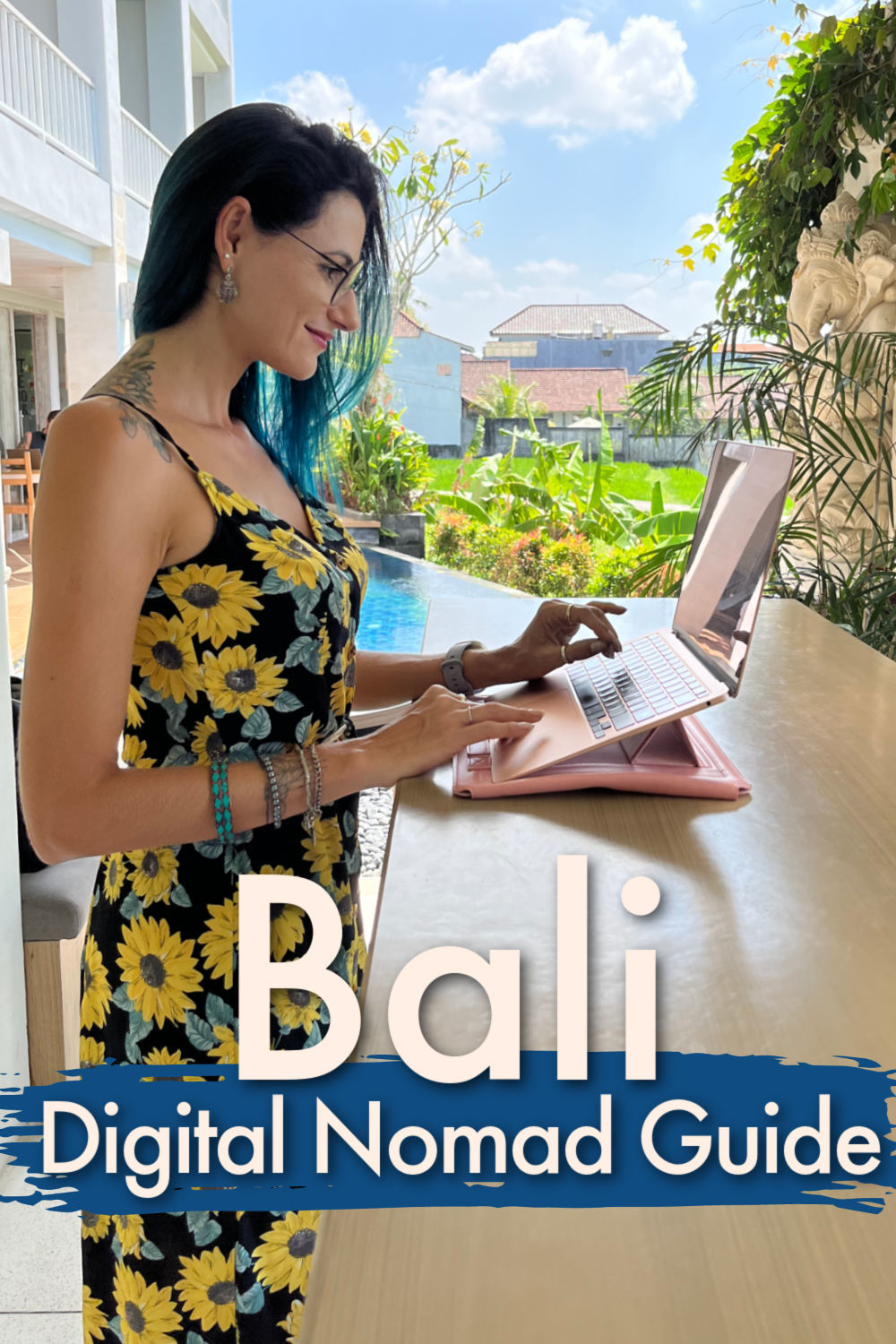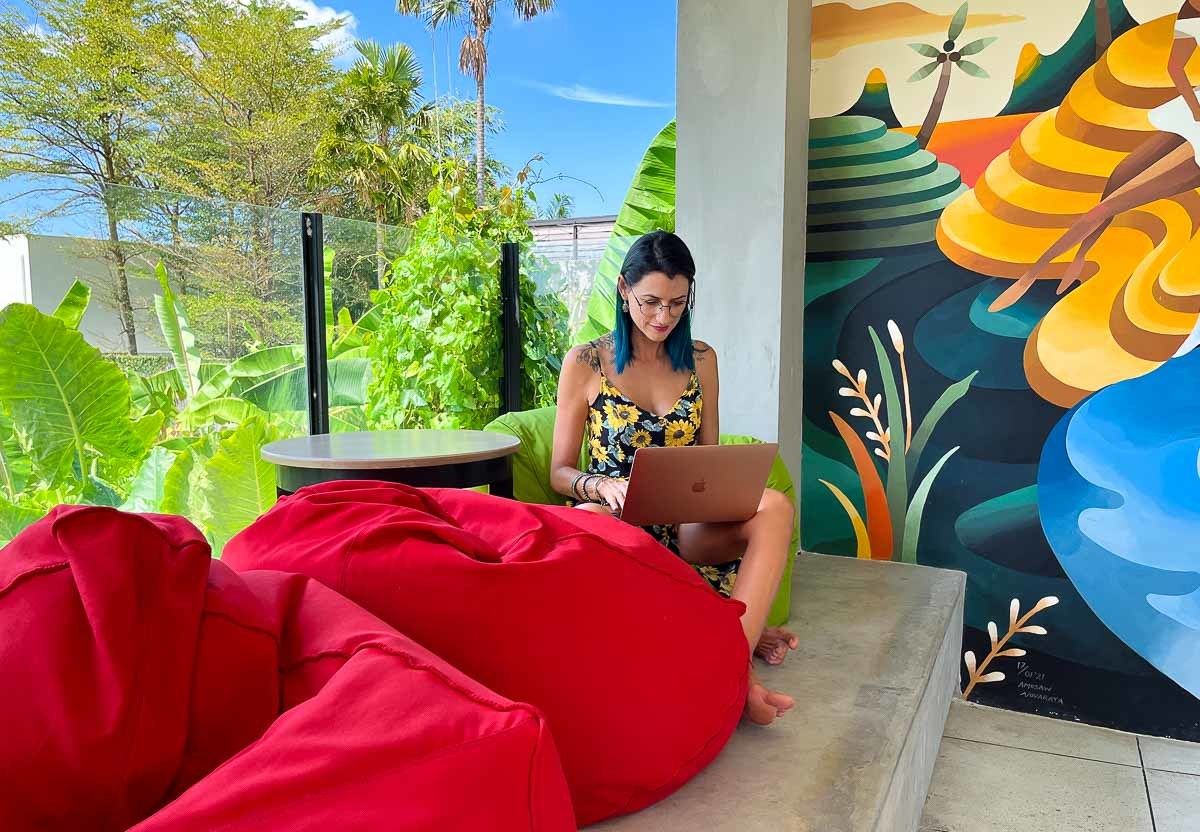Some of our links are affiliated, we will earn a commission when you buy a service or product. This will have no extra cost for you. For further info please refer to our Privacy Policy
Wake up with rice field views, then meditate and go for a run at the beach. Next is a healthy breakfast in a trendy cafe and a work session at a nice coworking space. The dream lifestyle of a Bali digital nomad is real. I’m living it, and so can you!
But let’s be honest, being a digital nomad in Bali is not only Instagram shots, affordable cost of living, and surfing. There are tons of things you need to think of, plan and organize before traveling to Bali. Plus a lot of stuff you will have to deal with when arriving here, and that’s why we wrote this guide.
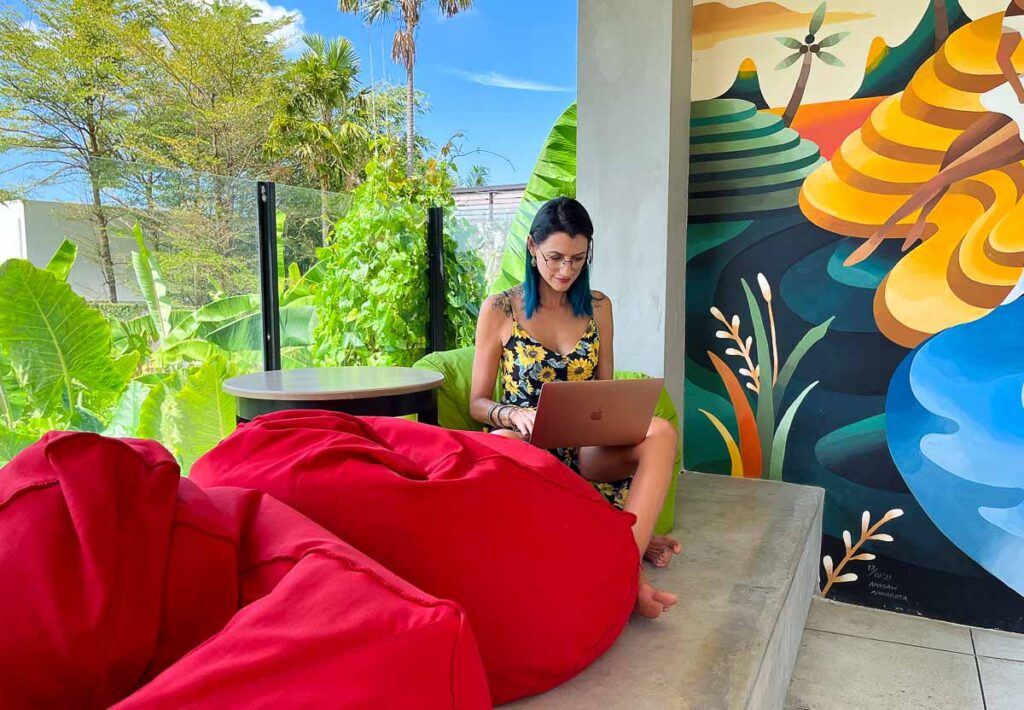
Bali Digital Nomad Guide – 2022 Edition
Bali is beautiful! There are so many things to do in Bali, and the island’s plethora of hotels, restaurants, and cafes are so great that it’s easy to understand why it has become one of the top destinations for digital nomads in 2022 and a hot spot in Southeast Asia.
The Indonesian Government also noticed Bali’s popularity and has its eyes wide open to the influx of digital nomads and remote workers on the island. Many changes were announced when Bali reopened for tourism; some will significantly impact the digital nomad community.
Rob and I have been to Bali a couple of times. Our first experience as digital nomads in Bali and traveling around Indonesia was in 2016. This year (2022), we decided to come back to enjoy the island, see what has changed, how Bali and its digital nomad community are, and if we still love it or not.
The first thing I can tell you is that Bali has changed a lot.
Second, Bali’s digital nomad scene is growing fast, especially in the Canggu area. With this growth comes good and bad things, and we will talk about them all.
But before we jump on the details about where to stay, work and play, we need to talk about practical and legal stuff. You must know three things before catching a flight to Bali and calling this Indonesian island your home. Here they are:
1 – Bali Visa options and Bali Digital Nomad Visa
The new visa for digital nomads is the biggest change in Indonesia’s approach to digital nomads and remote workers. The Bali Digital Nomad Visa hit the news in 2022 and is very much awaited.
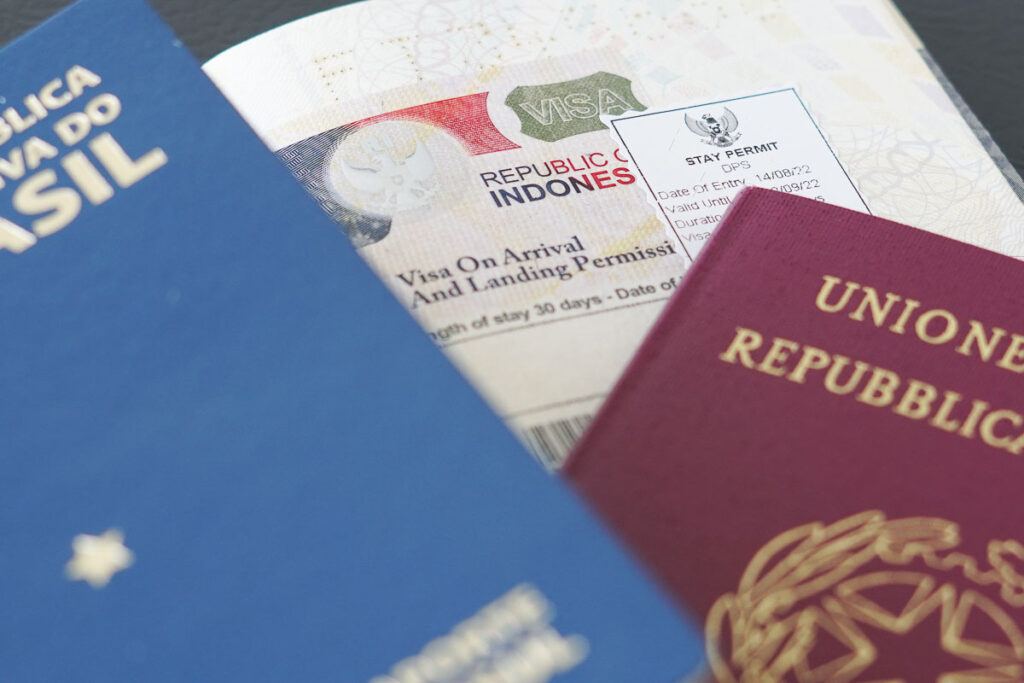
Indonesia’s Tourism Minister Sandiaga Uno informed that the agency is working on the draft to introduce the new visa. Bali’s head of Tourism, Tjokorda Bagus Pemayun, said, “the sooner, the better” although no date was mentioned. There are no concrete details yet about who can apply and the requirements.
Before booking your flights to Indonesia, you need to check if you are eligible for the tourist Visa on Arrival or if you need to apply in advance. Below are the two most common types of visas used by travelers who want to stay in Bali for longer.
Indonesia Visa on Arrival
Visa on Arrival is available to passport holders from 75 nations, including Australia, Brazil, Canada, Great Britain, India, Netherlands, Portugal, Singapore, Thailand, and the United States of America. The complete list is here. Note that what counts is your passport and not your residency.
To obtain the Indonesia Visa on Arrival, you need to present :
- Visa on Arrival fee Rp. 500.000
- Passport valid for six months since the date of entry
- Return or onward ticket
- The official might request other travel documents like proof of funds. Always go prepared.
Some travelers can get the 30-day Visa on Arrival and then extend it for more 30 days, which becomes a total of a 60-day tourist visa.
Indonesia Single Entry Visitor Visa (B211A)
The main type of Indonesia Visa you can apply for is the Single Entry Visitor Visa (B211A), which is valid from 60 up to 180 days. You can get this long-term visa for tourism, social, sports, and business purposes.
Note that you are allowed to attend a business meeting and buy goods, but you are not allowed to perform work activities in Indonesia. They also call this visa ‘Social Visa’, but the correct name is B211A.
You need to apply for the Single Entry Visitor Visa (B211A) outside Indonesia, and you can do it via a visa agent to facilitate the process.
There are other types of business visas like the Temporary Stay Visa for Work, the Single Entry Visitor Visa (B211C) for journalists, the One-Year Temporary Stay Visa for Investors, etc. The Indonesia Immigration website lists all the requirements for applying for visas to Indonesia.
Don’t trust any agency to handle your visa without checking if it’s trustworthy. Ask around and read the reviews online before giving your passport and money. Also, remember that the long-term digital nomad visa is not available yet. Keep an eye on the Indonesia Immigration website for updates.
And most importantly, don’t overstay your visa! Check very, very carefully the dates of your visa. Overstaying in Bali or any other immigration law violations can lead to fines and even deportation.
2 – When to travel to Bali – seasons, weather and what to expect
Bali has a tropical, warm and humid climate. Basically, the island has two seasons, the wet and the dry seasons.
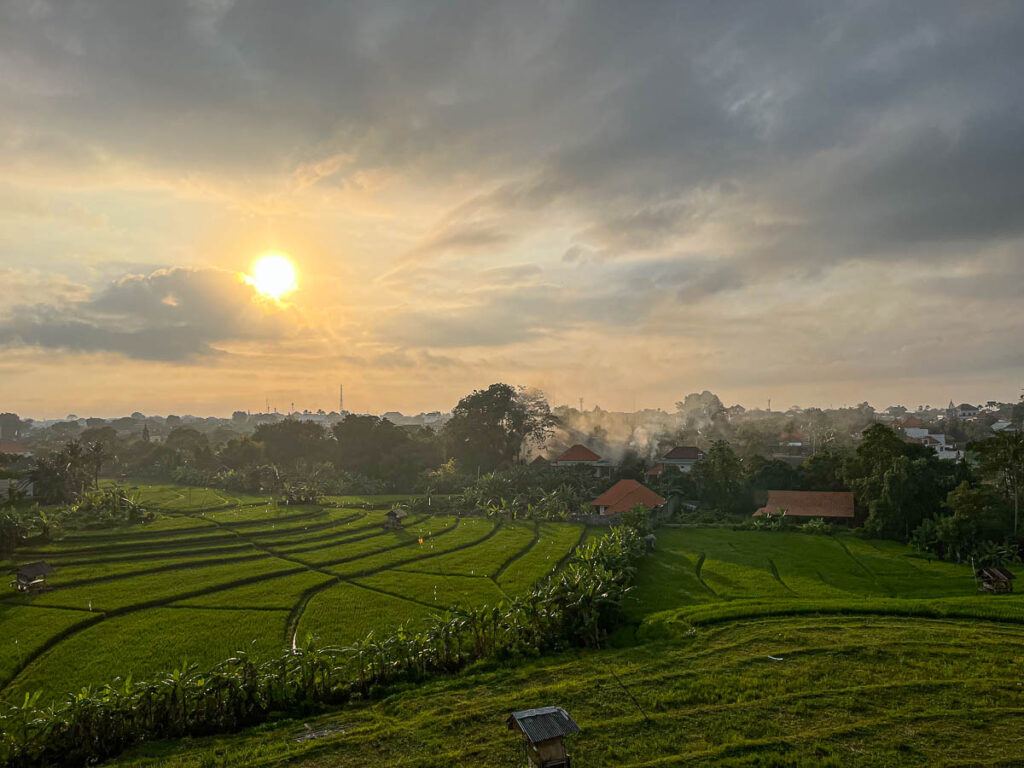
Bali dry season:
Bali’s dry season is from May to October, being August, in general, the driest month.
Bali rainy season:
Bali’s wet season is from November to April. Usually, January is the wettest month, and March is the hottest month in Bali. During the rainy season, it’s not rare to rain for an hour or so, and later, the sun appears.
Best time to visit Bali?
As you can imagine, the dry season is also Bali’s high season, and the peak of tourists will be in August. During these months everything is more expensive and crowded.
The island gets busier again between Christmas and New Year, even with the rain.
So, when is the best time to travel to Bali?
Travel to Bali is a good idea any time of the year, especially if you have the freedom to stay longer. But choosing the best time to go to Bali will depend on what you want to do and experience on the island.
Divers prefer to travel to Bali between April and October, when the sea and the winds tend to be calmer.
Surfers can stay in Bali for the whole year. The best waves hit the west coast during the dry season. Think of Uluwatu, Padang Padang, Echo Beach, Berawa… During the wet season, you can surf on the east coast like Keramas, Sanur and Serangan.
You can travel to Bali any time of the year for yoga, fitness training, and any other wellness activity.
June and October are excellent months to travel to Bali, as you can have good weather and escape the crowds. If you plan to stay as a digital nomad in Bali for more than a month, I would recommend arriving here a bit before the peak of the high season, so chances are you can settle quickly and find better options and prices for accommodation.
For those planning to stay six months in Bali, you can combine the shoulder and high seasons to taste the two different life moments on the island.
3 – Health, safety and travel insurance
Before starting your trip to Bali, there are a few health and safety things you need to know:

Vaccinations:
After Bali reopened for tourists, the vaccination requirements have changed a few times and travelers must keep an eye on the Indonesia Travel and Indonesia’s Immigration website for the latest updates.
At the time that I’m writing this guide, travelers must be double vaccinated for COVID-19. You must download the government application (PeduliLindungi app) and submit your vaccine certificate. When arriving at Bali airport, you must go to the safe and healthy counter before paying for your Visa and passing the immigration officials.
At the vaccination check counter, you must show your vaccine certificate. My recommendation is to have it printed to make the process easier. I know it sounds silly, as you already uploaded it to the PeduliLindungi app, but it’s better to have it printed instead of relying on the app or phones.
Non-vaccinated travelers are also allowed to enter Indonesia. They just need to follow more steps.
When it comes to other types of immunization, there are no mandatory vaccines for Bali. The World Health Organization recommends travelers to get protection for Tetanus, Hepatitis A and B, Typhoid and Rabies. Remember that if you want to get these shots, you better talk to your doctor 6 to 8 weeks before traveling to Bali, so you will have enough time to get all the jabs and be immunized.
Travel insurance for Bali
Travel and health insurance are not mandatory for Bali, but you should have it anyway, and here is why:
- Bali Belly, the traveler’s diarrhea is more common than you think, and you might need hospital care.
- Surfing injuries are a real pain. If you already had a reef burn, you know what I’m talking about.
- Traffic accidents. The most common and dangerous health and safety problem in Bali.
- You might need medical care during your long stay here.
- If your trip to Indonesia gets interrupted, a natural disaster happens, or your luggage is lost, you will be covered.
In Bali and Thailand, we see many travelers setting up GoFundMe campaigns to gather money for medical expenses, most of which are because of motorbike accidents and no travel or medical insurance.
So do yourself a favor, and buy travel insurance before moving to Bali!
SafetyWing is our travel insurance, and we like it because of its comprehensive coverage, 24 hours worldwide customer service, and that you can buy and renew it while traveling.
We already had to use our insurance, which was a smooth process. We paid for Rob’s medical assistance (hospital visit, exams and treatment) and got our refund after submitting all the documents online.
You can get a quote on SafetyWing website here. And before buying any travel insurance, read the policy carefully and check if they cover all that you need and all that it’s required for the destination you are traveling to.

Drugs and prescribed medication
Indonesia has a strict drug policy, including some prescribed medicines. So if you need to take any prescribed medication daily and/or for extended periods, you must do good research.
Some medicines prohibited in Bali are:
- Codeine (found in painkillers)
- Opioids
- Pseudoephedrine
- Dexamphetamine (ADHD medication)
- Benzodiazepines (Canax, Valium…)
If caught entering Indonesia with illegal medicine, you can go to jail, from a few days up to years. Once in a while, we read about a traveler arrested with illegal medicines. If you are in doubt about what you can carry or not, send an email to the Indonesian Embassy or consulate in your home country.
Health care in Bali
Regarding health and safety, it’s good to know that Bali has public and private hospitals. Also, there are medical clinics in most tourist areas like Kuta, Seminyak, Canggu, and Ubud. And you will find English-speaking doctors and nurses in most medical facilities.
If you need any medical assistance, you can visit one of the clinics near you or even call for a doctor to come to your hotel or villa. But if you are really unwell, injured, or had a bad accident, calling an ambulance or going to a private hospital are the best options. And don’t forget to bring your passport and travel insurance details.
Bali Digital Nomad Life and Community
Now you know which visa you need for Bali, when to travel here and that you must have travel insurance, so let’s talk about living in Bali as a digital nomad. In this part of the guide, you will find information about the best areas to stay in Bali, coworking spaces and laptop-friendly cafes, how to get around Bali, living costs, food, culture, fun and travel.
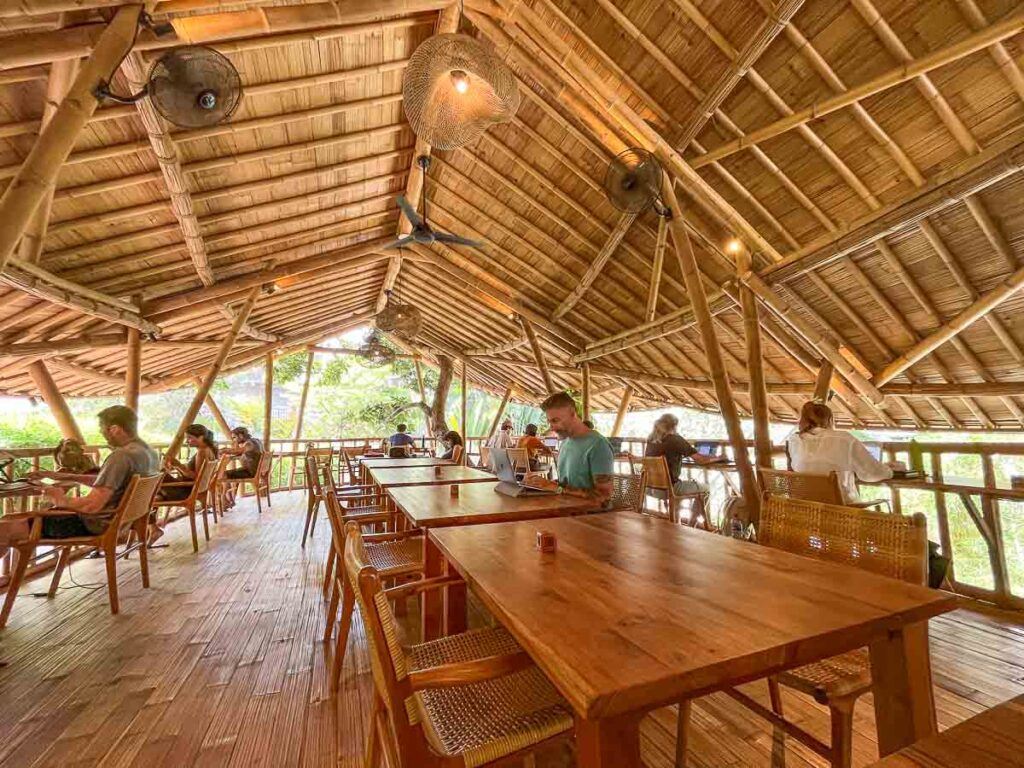
This guide focuses on Bali’s digital nomad community and facilities, so we won’t be talking about the whole island, mainly because it’s pretty big and some areas are quite remote. But once here, don’t forget to spread your wings and discover the unknown corners of Bali and Indonesia.
Bali Internet and SIM cards
First things first: Internet in Bali.
Every cafe, restaurant and hotel will have internet available for their customers, but it doesn’t mean it will be a fast and stable connection. Coliving and coworking in Bali will be the best options for those who need fast internet 24/7. Some will announce the average internet speed on their websites (we’ll talk more about coworking spaces in Bali later on).
Indonesia is still a developing country, so the internet, electricity, and water are not 100% reliable. We’ve never experienced a power or water shortage, although we had days with a weak internet signal. I used to joke back in 2016 that if the rain comes, the internet goes. But things have changed, and fiber optic internet and 4G are faster and proportionally cheaper.

How to get internet in Bali?
4G networks are available in most of Bali but expect weaker coverage in remote regions.
In Bali digital nomad areas, the phone internet works fine.
All you need is to buy a prepaid SIM Card with data on it and top up when it finishes. Remember that your phone must be unlocked to work with Indonesian SIM cards.
Go to one of the phone shops (they are everywhere, especially in tourist areas) with your passport and choose the package you want. They will register your passport in the system, and depending on the company you choose, it will take from minutes to a couple of hours to get the SIM card working. It’s super easy, and the people at the shop will do all the setup for you.
The most common mobile operators in Bali are Telkomsel and XL Axiata, we used both, and they worked pretty well.
We will talk about the costs of a digital nomad in Bali later on, but to have an idea, a SIM Card in Bali with 16GB valid for 1 month is about USD 5.
You can buy a SIM card at the airport shops if you need internet when arriving in Bali, but they will cost you the double than local shops. If you can wait, buy your SIM card at the local shops, and even though you will see that prices vary a lot from a touristy street to a more local area. The same happens for top-ups.
Another thing you need to be aware of is that the SIM Card and top-up you get in Bali might not work in other islands in Indonesia. That’s because they have local and national coverage. Go to a shop and get the correct information and top up before leaving Bali, so you know your phone will work at the next Indonesian destination.
Power Plug in Bali
After the internet, electricity and power plugs are digital nomads’ next biggest concern. Again, most cafes and restaurants will have power outlets that you can use. But I suggest you to always charge your electronics and equipment in your hotel room, chances are that you will have better power outlets and a stable power supply there.
Indonesia and Bali power plug is type 2-pin, 220 volts/50Hz. It’s similar to Australia and Europe. If you need an adapter to charge your equipment, get a good one to avoid any electrical accident. Another option is to buy a power extension with a surge protector to defend your electronics against voltage spikes.
Best areas to stay in Bali for Digital Nomads
Bali is a province in Indonesia and its capital city is Denpasar. The island is divided into regions, being Kuta beach, Legian beach, Seminyak, Canggu, Uluwatu, Ubud, Sanur, Nusa Dua, Amed and Denpasar the busiest and most famous areas in Bali.
Canggu and Ubud are the hotspots for digital nomads in Bali. You will find many successful digital entrepreneurs and people just starting their nomadic life in these two areas. Making it easy to find like-minded people and be part of a community.
With the boom of digital nomads in Canggu, travelers that want to stay by the sea find their way to Uluwatu and Sanur. These two regions are famous among tourists and are slowly becoming digital nomad hubs.
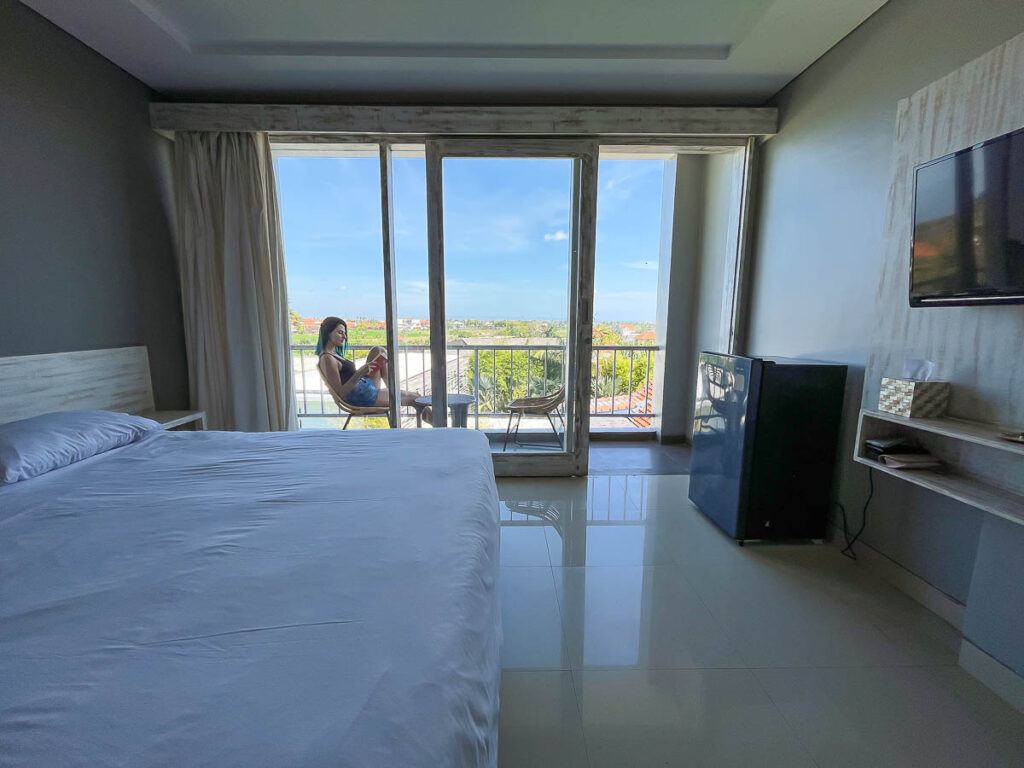
Bali accommodation options
Accommodation in Bali varies a lot, from luxury villas to hotels, coliving, budget guesthouses, and hostels. You can choose based on your budget, style of travel, or location.
Hotels and resorts in Bali will provide a room with breakfast, pool facilities, bars and restaurants, and sometimes a gym.
You can rent a villa in Bali or a room in a shared villa. In this case, the sky is the limit for comfort, facilities, and prices. Most villas in Bali are advertised on websites like Airbnb and Top Villas, or you can contact a local real estate agent.
Most of the guesthouses and colivings in Bali will have a shared communal area, a shared kitchen and a pool. The colivings will also have coworking spaces that guests can use for free, and some will have a cafe or a restaurant open to the general public.
If you don’t mind staying in a dorm, hostels can be an option for cheap accommodation in Bali. Most Bali hostels will have a communal kitchen, a cafe, and a sitting area where you can work.
These four types of Bali housing and accommodation can be booked for a few days up to a month, and you can find them in Canggu and Ubud, and probably in Sanur and Uluwatu areas. Just keep in mind that if you are coming to Bali in the high season, you must book your accommodation well in advance. For yearly rentals, the best is to deal with real state agents.
So, where is Bali’s best place to stay as a digital nomad? The answer will depend on what type of experience you want to have. To help you choose your home in Bali, we created a checklist of reasons to stay in each area, plus where to stay.
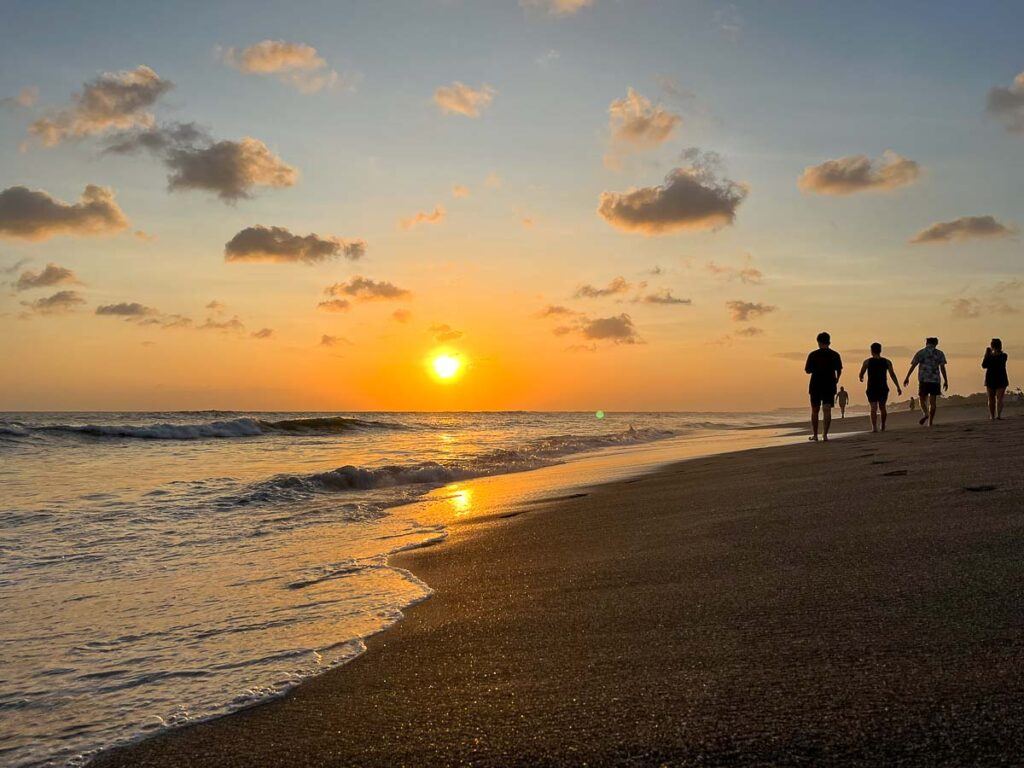
Reasons to stay in Canggu, Bali
- It’s close to the unique Bali black sand beaches
- It’s a hot spot for digital nomads and travelers
- Best options for coworking spaces
- Wide variety of accommodations for all budgets
- Good options for Coliving Spaces
- Fantastic options for food, from local to international cuisine
- Good Surf
- Parties and beach bars
- Live between the rice fields and the beach
Where to stay in Canggu, Bali
- Dojo Bali Coworking – Dojo has a shared kitchen, a swimming pool, and 24/7 access to the coworking. You can’t beat its location, only a 3-minute walk from the beach, and rooms start at USD 1320/month.
- Outpost Canggu – Outpost Canggu offers 4 types of rooms, a shared kitchen, a swimming pool, and 24/7 access to coworking. It is located 8 minutes walking from the beach, and rooms start at USD 1248/month.
- Matra Coliving & Coworking – Matra has 3 types of rooms, its coworking is open 24/7 and is a 5-minute drive from the beach. The rates start at USD 370/month.
- Shashvata Bali – A quiet coliving with lovely rice field views. There is a pool, a cafe, and 24/7 access to coworking. It is a 13 minutes drive from the beach, and the rates start at USD 370/month.
For hotels and hostels in Canggu, check the rates and availability on Booking.com or Agoda.

Reasons to stay in Ubud, Bali
- It’s Bali’s cultural and religious heart
- Lush nature around you
- Strong digital nomad community
- Yoga and wellness-focused lifestyle
- Rice terraces, jungle, and stunning temples nearby
- Coworking and coliving options
- The food is excellent. Plenty of vegetarian and vegan options
Where to stay in Ubud, Bali
- Outpost Ubud Coliving Suites – Located in the heart of Ubud community and 4 kilometers from the Outpost Ubud Penestanam, where the coworking is located. Rates start at USD 1065/month.
For hotels and hostels in Ubud, check the rates and availability on Booking.com or Agoda.
Reasons to stay in Uluwatu, Bali
- Surf is amazing
- Good option of accommodation with stunning villas and hotels
- As Canggu and Ubud are getting more expensive, you can find accommodation in Uluwatu with better rates.
- Touristy area but with a few digital nomads (so far)
- Bars with amazing views
Where to stay in Uluwatu, Bali
There is still missing a proper coliving in Uluwatu. Your best option is to stay at hotels and hostels or rent a villa.
Check some options in this map:
Where to work in Bali as a digital nomad?
There is no shortage of beautiful coworking spaces in Bali, and many of the island’s coffee shops and restaurants will welcome you and your laptop with a big smile. Most Bali coworking spaces offer daily and monthly passes. For the cafes, as long as you order food and drinks and the house is not full, you can stay working for a certain period of time.
Here is a list of the laptop-friendly cafes and the best coworking spaces in Bali (most will have private meeting rooms in case you need them). They are organized by area, so you can choose a place to work in Bali that will be close to your accommodation.
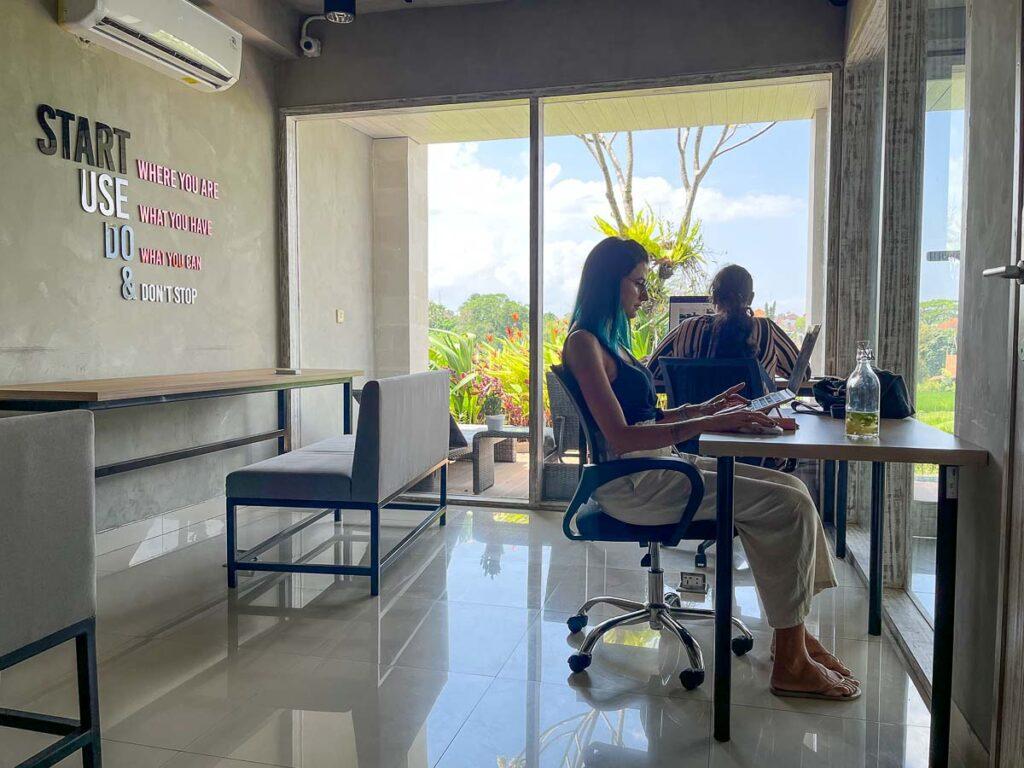
Coworking spaces in Canggu:
Laptop-friendly cafes in Canggu:
Coworking spaces in Ubud:
Laptop-friendly cafes in Ubud:
Coworking spaces in Uluwatu:
Getting around Bali, Indonesia
Bali is a big island with 5,780 km², and you will need a car, a motorbike, or a bicycle to get around. Motorbike is the most common mean of transportation in Bali. You can choose to ride one or use the motorbike taxi services.
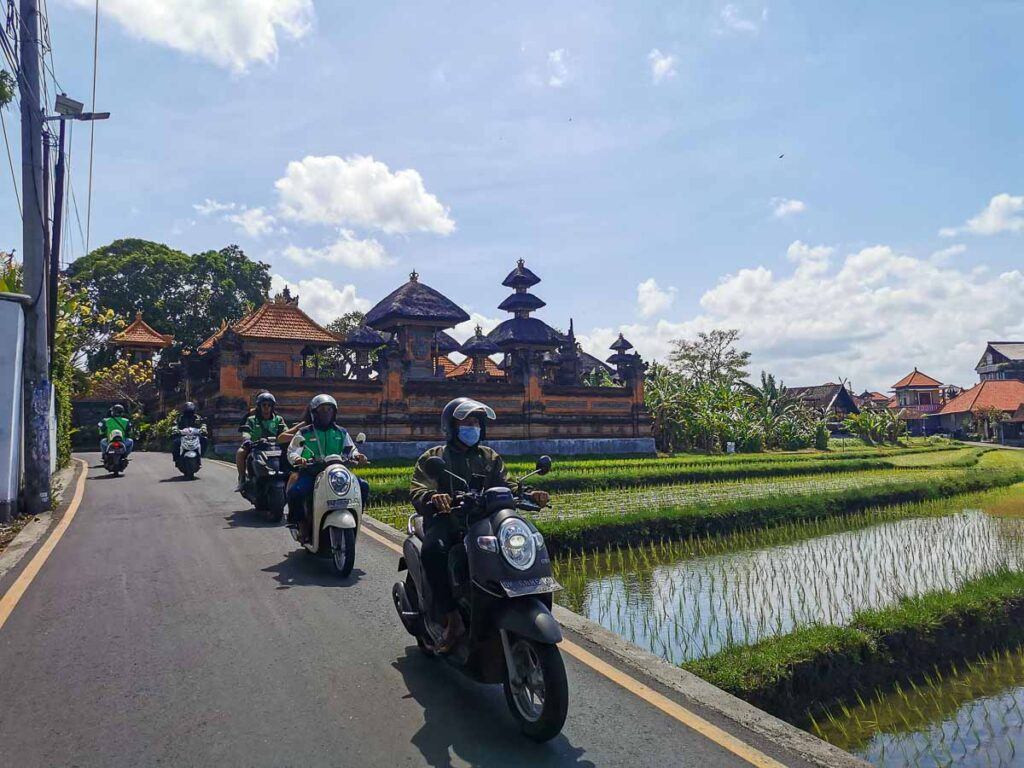
Getting from Bali airport to your accommodation
You will probably get a taxi from Bali Ngurah Rai International Airport, aka Denpasar International Airport, to your accommodation. Official and unofficial taxis are available in front of the airport terminal, but the best option is to order a taxi via Grab app before leaving the airport.
Another option is to book in advance an airport pick-up service. Check this list of Bali airport transfers or talk to your accommodation and ask if they offer this service.
Renting a motorbike in Bali
Driving a car or riding a motorbike in Bali is not for the faint of heart. Bali traffic is a real issue. Denpasar and Kuta are busy all year round, Seminyak, Canggu, and Uluwatu are okay during the low season, but they become insanely busy during the high season.
In addition to the heavy traffic and insane amount of motorbikes running around, the streets are narrow with endless twists and turns. Getting from point A to B can be a real struggle if you are not a confident driver.
Now that you know the bad things about driving a scooter in Bali let’s get to the practical stuff. Many shops are renting all types of motorbikes, the scooters being the most common and cheapest ones.
You can shop around and check the daily and monthly rental prices. Then search online for scooter rental in Bali, check out the companies’ reviews, and call them asking for a quote. A good rule of thumb is to ask at your accommodation if they recommend a bike rental company, get a quote and compare with other shops.
Most of the companies will deliver the bike to your accommodation. They will take a photo of your passport, of you, and the front of your home or hotel in Bali for safety purposes. The rental companies will ask for a deposit and the payment in advance. When you return the bike, and if everything is ok, you get your deposit back.
You must have an International Driving License to drive in Bali, and the police can stop and fine you if you don’t have one. Check with your country’s driver’s license department on how to make the international one. It’s mandatory for Bali and many other countries.
Always wear a helmet! You will see a lot of tourists and locals riding a bike without helmets, which is not the smartest idea, especially in Bali traffic.
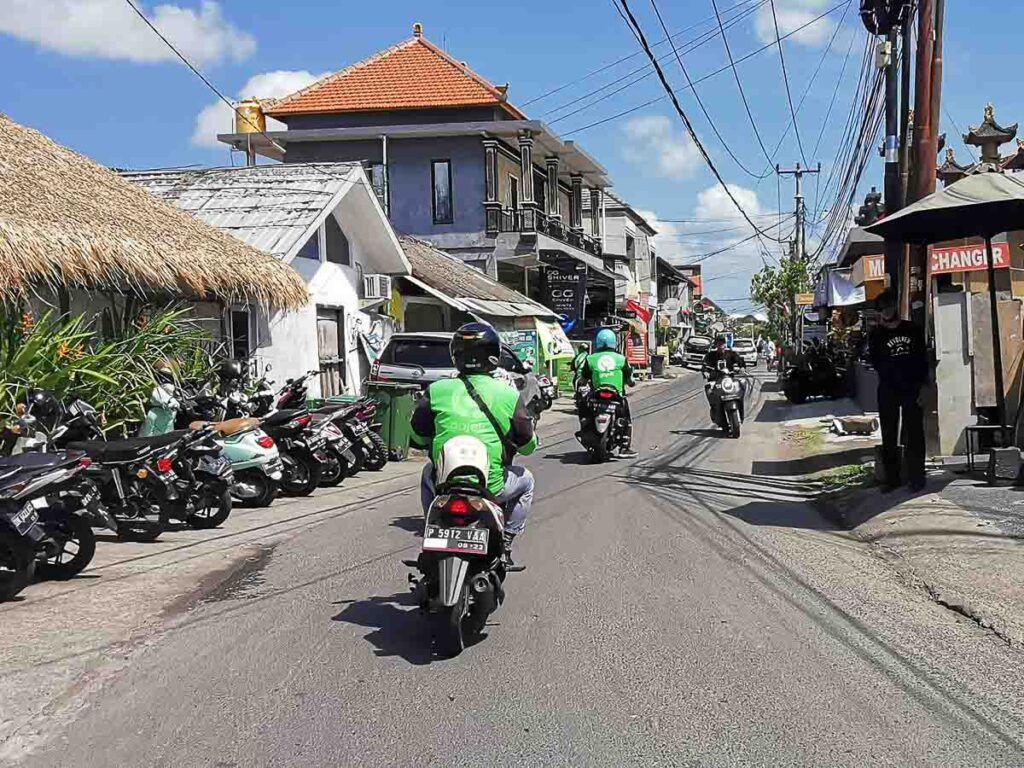
Taxi and motorbike taxis in Bali
Download Grab and GoJek apps and you can go everywhere in Bali. Don’t worry; these two apps are safe to use, and you can pay with a credit card online or with cash to the driver. You will see locals and tourists using them day and night.
Motorbike taxis are the best way to get around Canggu, Ubud, Seminyak, and any other busy area in Bali. All motorbike taxis wear a jacket and/or a helmet with the app brand and colors, making it easy to identify. They also provide helmets for the passenger, so you can ride safely.
Food in Bali
One thing is for sure, the food in Bali is AMAZING, and you will eat very well here!
I’m not listing the best places to eat in Bali, as this is not a food guide, but I want to give you an idea of what you can find here if you decide to join the Ubud or Canggu digital nomad community.
Bali’s food scene has everything, from amazing coffee to international cuisine, hipster cafes, trendy restaurants with beachfront dining tables, unique dining experiences, and street food.
Breakfast and brunch are big in Bali, especially in Canggu. There are many cafes offering breakfast deals that are mouthwatering and feeling (Crate Cafe, Shady Shack, Copenhagen, Milk & Madu, Satu Satu, to name a few).

Dining out is also popular, so if you want to have dinner in a specific restaurant, I recommend you book a table in advance, at least during high season.
All the laptop-friendly cafes we mentioned before are good places for breakfast, lunch or dinner. Some cafes and international restaurants might not be that budget-friendly, but the local Balinese restaurants are, and many of them serve delicious food.
Look for ‘Warungs’, the Indonesian word for small-owned shops. Most warungs will have a glass counter where the food is on display. You will get a plate of rice (white or brown), and you can choose different toppings from the buffet. They usually offer different types of protein (chicken, fish, beef, eggs, tofu, and tempeh), veggies, fritters, and sambal – a local chili sauce. The price is according to the amount of topping you choose.
Balinese cuisine is delicious, so do yourself a favor, find a warung and try a proper Nasi Campur, Nasi goreng, and Mie Goreng.
For lazy days and nights, you can order anything to be delivered to your home. Bali’s best food delivery apps are Grab, Gojek, and Gofood.
Bali cost of living and money handling
Most digital nomads coming to Bali are looking for a great destination with an affordable cost of living. And in fact, Bali prices are lower than many other digital nomad destinations, but the actual cost of traveling and living in Bali will depend on your choices and style of life.
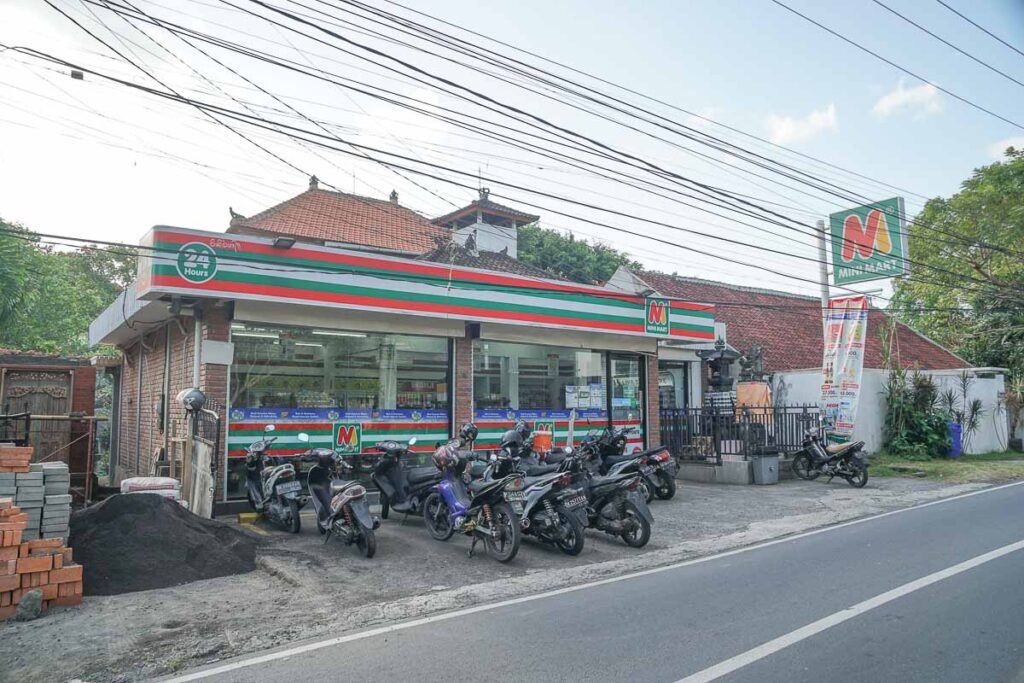
Bali digital nomad cost of living
Bali has affordable options but also expensive accommodation and experiences. This article about Bali prices will give you an idea of what to expect when arriving here. The prices are more focused on tourists staying in Bali for only a couple of days, so you know that you can spend less by booking long-term accommodation or renting a bike per month instead of daily.
Here is a ballpark of the cost of being a digital nomad in Bali for a month:
- Cost of accommodation in Bali: From USD 270/month in a simple hotel room to USD 1590/month for a private deluxe room in a coliving near the beach.
- Cost of renting a bike in Bali: The scooters start at USD 80/month, and the newer and more powerful models can reach up to USD 200/month.
- Cost of coworking in Bali: USD 6 for a day pass up to USD 250 for an unlimited monthly pass.
- Cost of food in Bali: USD 1.30 for a local Nasi Goreng, USD 7 for a western breakfast, and USD 30 for a steak.
- Cost of internet: You can get a SIM Card with 16GB valid for 1 month for about USD 5.
Those are the basic expenses of a digital nomad in Bali. On top of that, you must add the costs of fun, drinks, gym or wellness, clothes, and any other things you decide to buy.
Money handling and safety
The Indonesian currency is Rupiah, and it has a lot of zeros, which can be confusing to many people. To have an idea, on the day I write this guide, 1 USD equals 14,875.40 IDR and a coffee costs around 30,000.00 IDR.
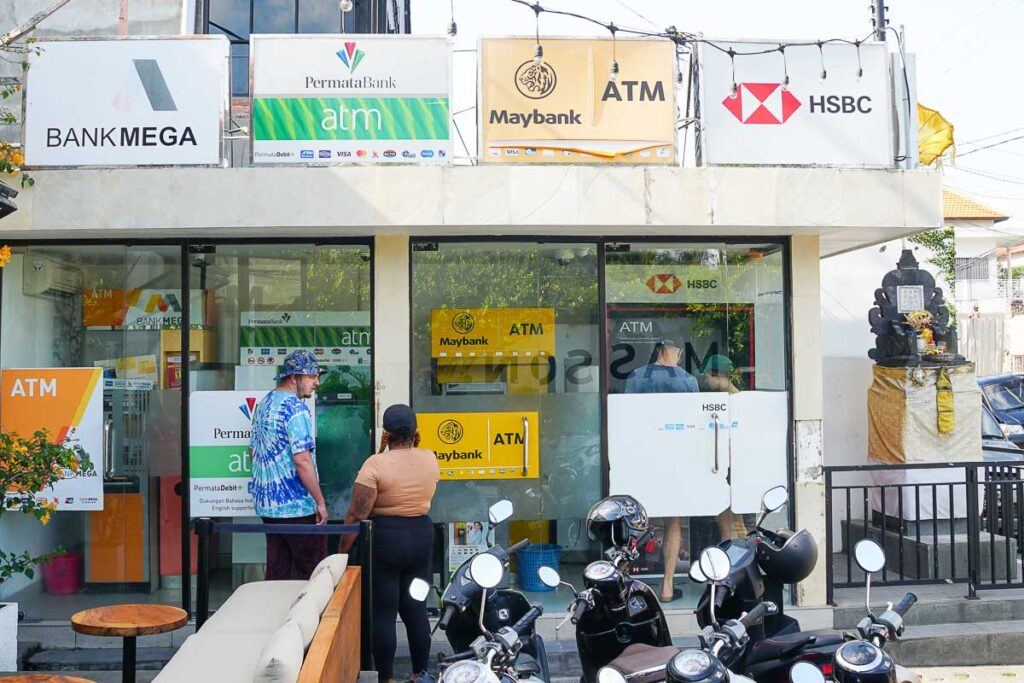
Most Bali shops, restaurants, and hotels will accept cash (Indonesian Rupiah) and credit cards. However, you will always need to have money with you for parking, street and beach vendors, for example.
There are ATM and exchange offices all over the island. Before traveling to Bali check with your bank if your card works in Indonesia and the fees they charge. This way you can do the math and check if it’s better to pay your expenses in Bali with your credit card, exchange money or withdraw money while here.
Your withdrawal limit can change depending on which Indonesian bank you are using. There is nothing wrong with your card, it’s the local bank rules.
When you need to withdraw money, choose an ATM inside a supermarket, a bank agency, or in a place that looks safe. We already had our card cloned and used online here in Bali. Not only us, but other friends also had the same experience, so always be careful with ATMs by the street.
Also, don’t forget your card at the ATM machine. Sounds silly, but it happens a lot. As the ATM gives first the money and then the card, many people get the cash and walk away without the card.
Sport, fitness and wellness in Bali
Bali is the perfect destination for digital nomads who are into sports and fitness. Surfing, kitesurfing, diving, and snorkeling are big here. So are yoga, CrossFit, boxing and martial arts.
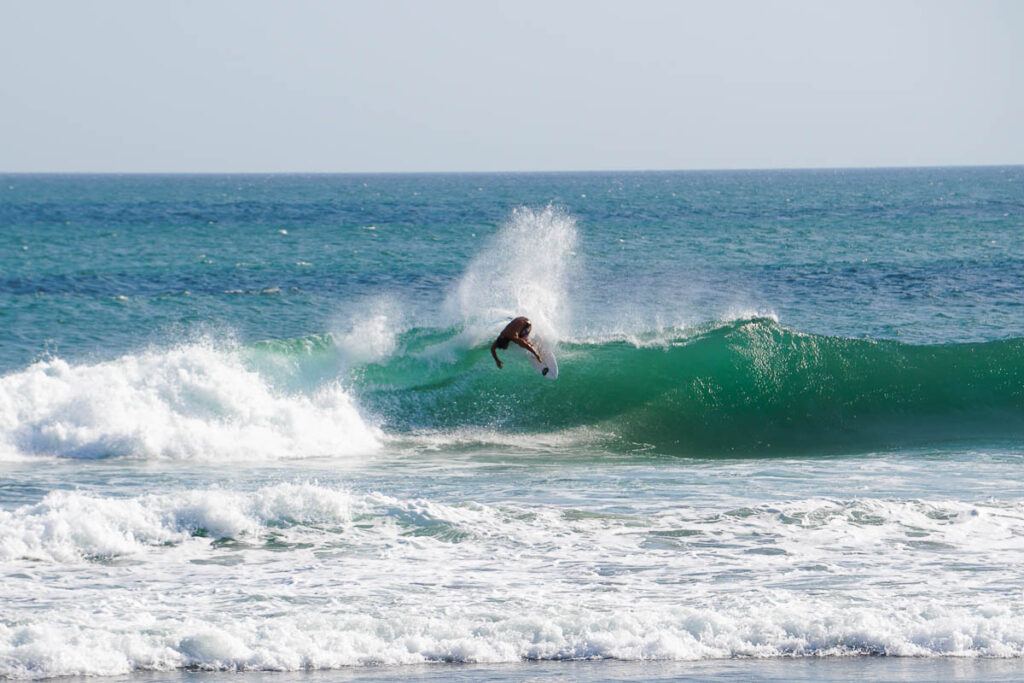
You can find good places to learn, practice and have fun here in Bali; it doesn’t matter if you are a pro, a beginner, or a sports enthusiast.
There are no excuses to not look after your body and mind while here. Bali breathes wellness with yoga studios and spas everywhere, and Ubud is the favorite location for those who want to focus on wellbeing.
Google is the best place to search for fitness centers, yoga classes, and gyms in Canggu, Ubud, and other regions. You can check the locations and reviews, plus there are bloggers focused on Bali yoga retreats, CrossFit, etc.
I found out that prices for gyms and fitness centers in Bali can be higher than in other digital nomad destinations. But a sure thing is that you have terrific places here, with first-class infrastructure and experienced instructors, and most of them have the Instagram vibe on point, perfect for content creators.
Having fun in Bali
The options of beach clubs, nightclubs, and bars in Bali are endless, from really upscale to more relaxed ones. And sunset sessions by the beautiful beaches are a must!
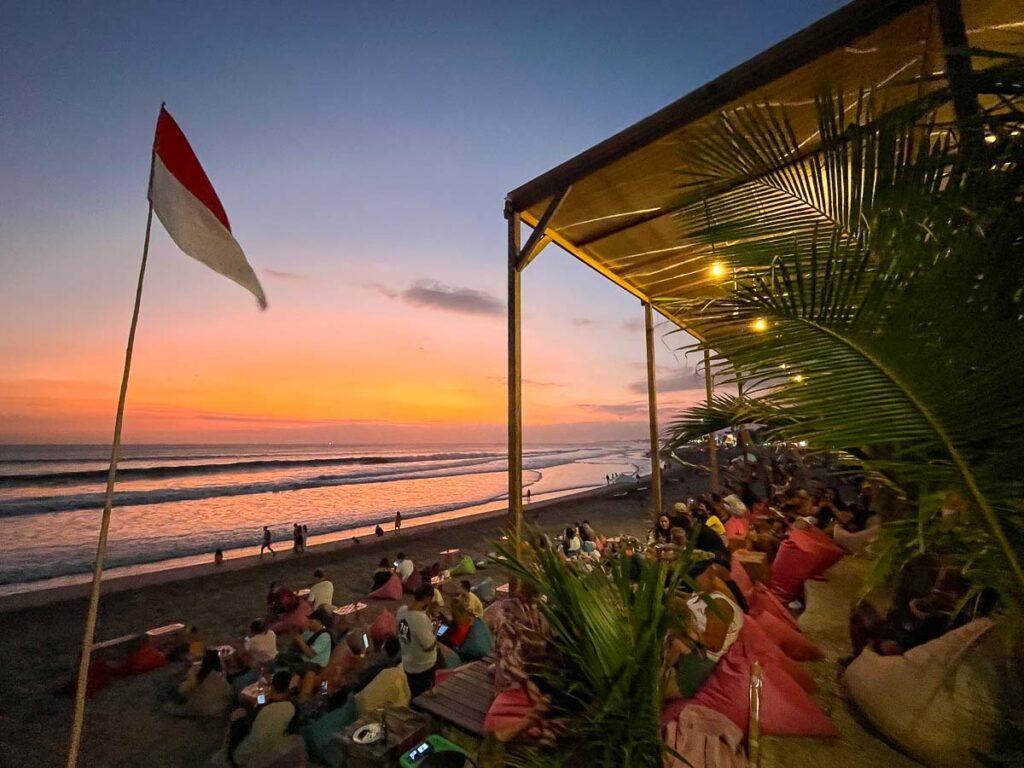
Depending on where you go, the crowd will be mostly tourists, long-term travelers, and expats. Others will be a mix of them and locals. Music wise, Bali is diverse. You will find EDM parties to techno nights and anything in between.
Kuta region is famous for its cheap nightlife and all-you-can-eat and drink venues. Seminyak has world-famous clubs like Potato Head, KU DE TA, and other smaller venues for drinks and dancing.
Canggu used to be a more relaxed area, but things are changing and now the beach clubs like Finns, The Lawn, and La Brisa are packed day and night. Canggu bars and clubs are open from Monday to Monday, proving that Canggu digital nomads, travelers, and expats like to party.
Beach clubs in Canggu have afternoon parties that go till late. Some bars have live music or DJs, and a couple of restaurants become nightclubs on some days of the week (Mondays at Luigi are crazy busy).
If you want to experience Bali nightlife, you better keep an eye on the party signs around Canggu and Seminyak. The rice field shortcut always has advertisements for the latest parties and shows.
Tik Tok and Instagram are also good for finding out places and parties to go to. And while driving around, you will see bars and restaurants packed, and if there is a queue to get in, the chances are it’s an exciting place.
Bali culture and religion
Bali is called the island of Gods, and when you arrive here, you will see why. Balinese culture and religion are unique and they are interconnected. And as you plan to stay longer in Bali, you better understand and respect it. Indonesia has six official religions, over 80% of the population is Muslims, and the others would be Christians, Protestants, Hindus, Buddhists, and Confucian.

Bali is a Hindu province, and its religion is a type of Hinduism that can only be found here. It combines aspects of indigenous rituals, Buddhism and Hinduism, making it very different from the Hinduism practiced in India.
The first things you will notice when moving to Bali are the temples and shrines. They are everywhere, with their incredible architecture, offerings and incense. Then you will probably see the colorful flower offerings in front of temples, house shrines, crossroads, and shops.
The offerings are called Canang Sari, and most Balinese people will prepare them daily. There are different rituals and offerings, as there are different gods to be pleased.
When visiting Bali temples, follow the rules and dress appropriately, covering shoulders and knees. Also, respecting the locals praying and showing respect for their culture is way more valuable than an Instagram shot.
If you are staying in Bali longer, I suggest you research about Balinese religious holidays. On some holy days, shops and restaurants will be closed, and you are expected to behave in specific manners. The most important date is the “Nyepi”, called the Silent Day and known as the beginning of the new year. During this celebration, no one should leave the house, including travelers.
Another curious thing about Bali’s culture is the Banjar, local police that any foreigner must respect. The Banjar is a community member with administrative duties in a specific area or neighborhood. The Banjar will keep an eye on the people living in this area, regulate the traffic, organize ceremonies, and act as an intermediary in some conflicts. In case of a problem, they arrive first, followed by the police.
The longer you stay in Bali, the more you will see, experience and learn about its culture and religion. My advice is to have an open mind and heart to understand that you are the outsider in their home. Be friendly and enjoy it!
Cons of living in Bali as a digital nomad or remote worker
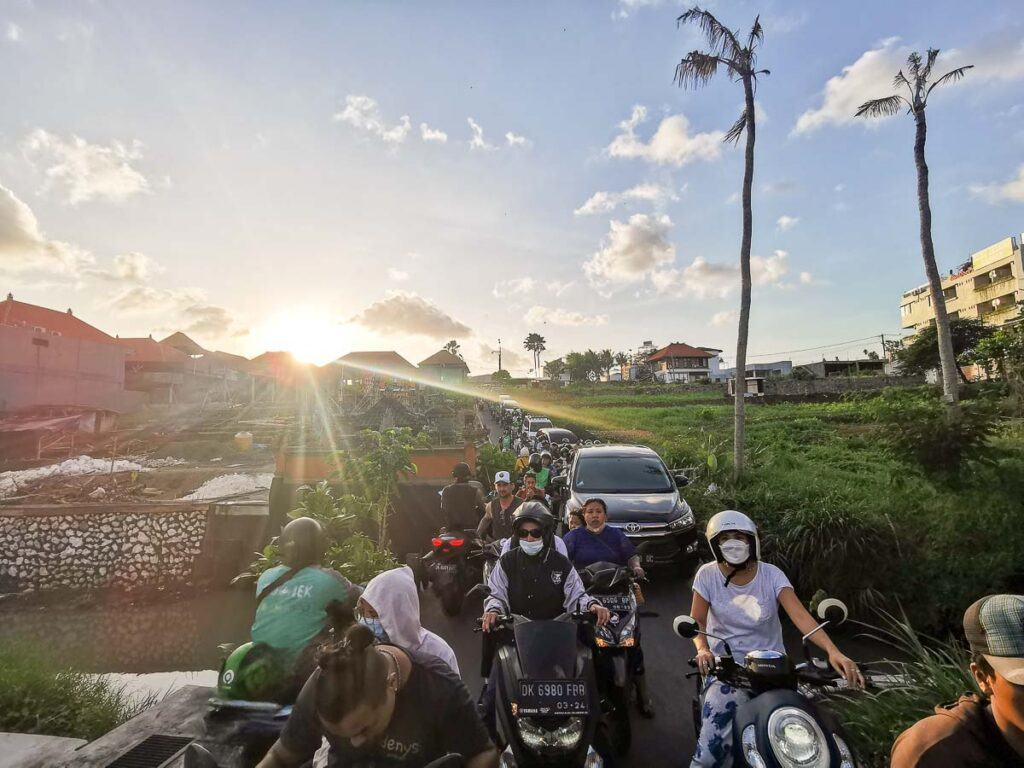
We talked about the great things of being a digital nomad in Bali, but it’s not all fun and games. There are a few negative things worth mentioning.
- Traffic: be ready for traffic jams even when riding a scooter. The streets are narrow with thousands of scooters fighting for space.
- Overdevelopment: tourism sector is booming, and things are changing fast. Rice fields are disappearing, and more and more villas are being built, which leads to another issue…
- Pollution: with more people, there is more garbage, sewer and fumes. The island’s infrastructure is still being developed.
- Safety: pickpocketing is not rare in Kuta, and it’s not advised for women to walk or ride scooters alone during the night.
That’s a wrap! Our Bali digital nomad guide is done. I hope it helps you to plan your way to Indonesia, how to be a digital nomad in Bali and how to make the most of this stunning island.
Wishing you a great time in Bali, and don’t forget to travel to other parts of Indonesia. Beautiful places like Nusa Lembongan, Nusa Penida and its gorgeous beaches, Komodo and its dragons, Wakatobi, Borneo, and many more are waiting for you.
Love this Bali Digital Nomad Guide? Pin it for later!!
